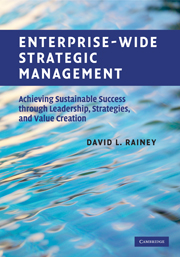 Enterprise-Wide Strategic Management
Enterprise-Wide Strategic Management Book contents
- Frontmatter
- Contents
- List of figures
- List of tables
- List of boxes
- List of abbreviations
- Introduction
- Part I Context: Laying the foundation and the underpinnings of ESM
- Part II Strategic management: Formulation and implementation
- 6 Strategic management framework and strategic analysis
- 7 Strategic formulation – options, mission statements, and objectives
- 8 Strategy formulation – business strategies and action plans
- 9 Strategic implementation and execution
- 10 Reflections and concluding comments
- Index
- References
10 - Reflections and concluding comments
from Part II - Strategic management: Formulation and implementation
Published online by Cambridge University Press: 05 June 2012
- Frontmatter
- Contents
- List of figures
- List of tables
- List of boxes
- List of abbreviations
- Introduction
- Part I Context: Laying the foundation and the underpinnings of ESM
- Part II Strategic management: Formulation and implementation
- 6 Strategic management framework and strategic analysis
- 7 Strategic formulation – options, mission statements, and objectives
- 8 Strategy formulation – business strategies and action plans
- 9 Strategic implementation and execution
- 10 Reflections and concluding comments
- Index
- References
Summary
Introduction
As discussed throughout the book, enterprise-wide strategic management (ESM) is a more inclusive, more sophisticated, and realistic strategic management framework for leading change in complex business situations. ESM is based on several key premises. One of the most important is that the overarching goals are to create extraordinary value and achieve sustainable success. Extraordinary value and sustainable success are developed and achieved through enterprise-wide strategic leadership (ESL), holistic thinking, proactive business strategies, strategic innovations, and outstanding implementation and execution.
In today's business environment, strategic leaders have to reach out beyond the traditional perspectives of “supply and demand” approaches and the narrow focus on competitors, the markets, and customers. They have to engage, interact, and understand the whole business environment and market spaces. This includes critical driving forces of the social/human world and the natural environment. These broader perspectives result in the ability to lead change and to discover, develop, and deploy enhanced solutions to take advantage of the opportunities and to resolve or eliminate many of the problems facing businesses and humankind. Most importantly, they provide critical insights for future business prospects, long-term financial success, and sustainable business performance.
Despite the ever-growing complexities of large companies, the accelerating intensity of competition, and the threats from emerging competitors in developing countries, the business world of today is still vibrant and full of opportunity. However, most of the exciting opportunities go beyond traditional markets or those associated with conventional competitive strategies.
- Type
- Chapter
- Information
- Enterprise-Wide Strategic ManagementAchieving Sustainable Success through Leadership, Strategies, and Value Creation, pp. 489 - 500Publisher: Cambridge University PressPrint publication year: 2009


